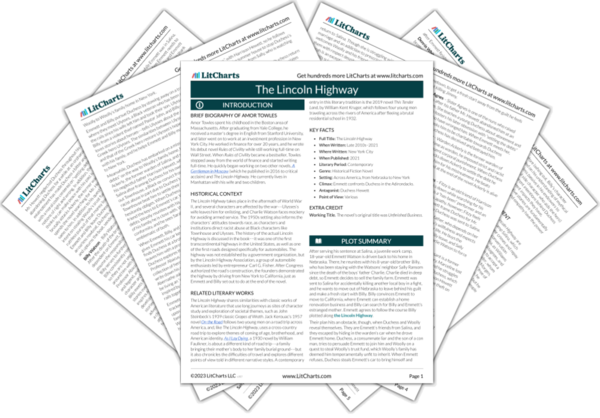Three of The Lincoln Highway’s main characters, Emmett, Duchess, and Woolly, have all recently turned 18, and each one adjusts to adulthood differently. Emmett’s father Charlie is dead by the time Emmett finishes his sentence at Salina, requiring Emmett to step into the role of guardian for his 8-year-old brother Billy. Billy’s dependence on him forces Emmett to grow from the quick-tempered boy who was sent to Salina into a responsible young man. Billy repeatedly reminds Emmett to be careful of his temper, and Emmett thinks of Billy almost every time he pauses to calm himself before responding to something that angers him. In contrast, a lack of responsibility prevents other characters from maturing. Woolly’s family is so protective of him that they lied about his age in court so that Woolly wouldn’t be tried as an adult. His friends, too, try to shelter him, with Duchess regarding Woolly as someone he “looks after.” This constant protection by other people prevents Woolly from taking on responsibility as Emmett does, as his family and friends continue to treat Woolly as a child. Woolly wants to help his friends, but he only manages to provide for them by willing them his trust fund after taking his own life. Duchess, too, remains in a state of stunted maturity throughout the novel, for the opposite reason that Woolly does: Duchess’s neglectful father Harrison Hewett never taught Duchess the importance of responsibility for himself or others, robbing Duchess of any opportunity to develop beyond the resentful and self-serving young man he becomes. The boys’ varying maturity levels suggest that being an adult consists in taking responsibility for one’s own actions and how they affect others.
Maturity and Responsibility ThemeTracker

Maturity and Responsibility Quotes in The Lincoln Highway
Emmett considered offering Jake an apology, but Jake wasn’t there for an apology. Emmett had already apologized to Jake and the rest of the Snyders. He’d apologized in the hours after the fight, then at the station house, and finally on the courthouse steps. His apologies hadn’t done the Snyders any good then, and they weren’t going to do them any good now. […]
––If we’ve got unfinished business, Jake, let’s finish it.
Jake looked like he was struggling with how to begin, like the anger he’d expected to feel––that he was supposed to feel––after all these months was suddenly alluding him.
He felt the heat of indignation […] that this man whom he had only just met should take the liberty of scolding him as a parent scolds a child. But at the same time, Emmett understood that his taking umbrage at being treated like a child was childish in itself. Just as he knew that it was childish to feel […] jealous over [Billy and Ulysses’] sudden confederacy.
––[…] after fifty-five years in Nebraska, I think I can tell a stayer from a goer.
––Is that so, I said. Then tell me, Mr. Ransom: Which am I?
You should have seen his face when I said that. […]
––I have indulged you in your manner and your habits; indulged you in your temper and your tongue. But Sally, so help me God, I have come to see that I may have done you a terrible disservice. For by giving you full rein, I have allowed you to become a willful young woman, one who is accustomed to nursing her furies and speaking her mind, and who is, in all likelihood, unsuited to matrimony.
[O]f all the boys whom Emmett had known at Salina, he would have ranked Duchess as one of the most likely to bend the rules or the truth in the service of his own convenience. But in the end, Duchess was the one who had been innocent. He was the one who had been sent to Salina having done nothing at all. And he, Emmett Watson, had ended another man’s life.
What right did he have to demand of Duchess that he atone for his sins? What right did he have to demand it of anyone?











